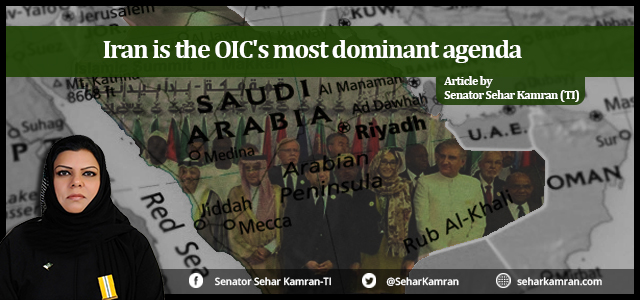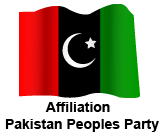By Senator Sehar Kamran (TI)
June 03, 2019
 The Organization of Islamic Cooperation (OIC) is the world’s second largest inter-governmental organization after the United Nations, and comprises 57 states and territories, representative of 1.7 billion people spread across three continents.
The Organization of Islamic Cooperation (OIC) is the world’s second largest inter-governmental organization after the United Nations, and comprises 57 states and territories, representative of 1.7 billion people spread across three continents.
The OIC summit which took place in Makkah over the weekend, comes at a time when the broader Muslim Ummah is going through deep turmoil due to multiple pull and push factors. This includes the latest standoff between the US and Iran, and escalating tensions between Iran and Gulf countries.
Saudi Arabia and the UAE accuse Tehran of attacking four oil tankers near the Gulf of Oman, off the coast of Fujairah by using naval mines. A US intelligence assessment and statement from the US National Security Adviser John Bolton confirmed the notion that Iran was behind the attack.
Following this sabotage operation, the Houthi militia attacked two of Saudi Arabia’s oil pumping stations in the town of Dawadimi and Afif city in Riyadh by using an explosive-laden drone.
The Iranian regime also threatened to choke off the Strait of Hormuz, and the fear of oil supply disruption from the Gulf sent shockwaves across the globe. The Strait of Hormuz is the world’s most important oil choke-point in the world. The narrow waterway forms a crucial link between the oil rich Gulf States and the energy-starved markets of Asia and there are almost no alternate throughways.
According to different estimates, between 17 million and 18 million barrels per day of crude oil pass through the strait, including 90% of Saudi Arabia’s output. Therefore, the aforementioned moves threatened the freedom of navigation and international trade and the stability of oil markets.
Keeping in view the rapidly changing security landscape and challenges faced by the region at large, Saudi King Salman bin Abdulaziz called an emergency summit of the Gulf Cooperation Council (GCC) and the Arab League summit. The primary rationale behind the consecutive summits was to extend cooperation to the countries in the region, including to the Iranian people, and to promote peace and stability.
The primary rationale behind the consecutive summits was to extend cooperation to the countries in the region, including to the Iranian people, and to promote peace and stability.
Sehar Kamran
Gulf countries, especially Saudi Arabia and the UAE, accused Tehran of interfering in their internal affairs, of using terrorism as a tool to intimidate neighbors, fuelling sectarianism and equipping proxies to de-stabilize and overthrow the legitimate government.
Moreover, the biggest worry for GCC states is Tehran’s growing ballistic missile capability which directly affects the security of the region.
In the wake of these glaring challenges, Riyadh hopes to garner support from GCC, Arab counties and the Muslim Ummah at large to form a unified stance not only for a country threatening regional and global stability but also to confront issues of common interest like fighting against terrorism and Deash.
The summits of OIC, GCC, and Arab League are perceived as an effort by Saudi Arabia to gather broad support against Tehran, whose aggressive posturing and growing ballistic might are threatening to create a ripple effect for international peace and stability.
In the midst of these heightened tensions, the US deployed an aircraft carrier to the Gulf and approved sending 1,500 more troops to the region.
Though tensions are rising between the US and Iran, recent statements from the US state department suggest the US does not want war or a regime change in Tehran. Instead, they want Tehran to renegotiate the nuclear deal, cease support for terrorist organizations and cap its ballistic missile program.
It is clear that Iran’s threatening posture dominated the agenda of the OIC summit. Saudi Arabia and the Gulf countries left no doubt that the organization must take a firm stance against Tehran’s growing belligerence. But now that the summit is over, the support Riyadh and its allies have garnered will reveal itself.
Recent statements have spotlighted one thing at least: that Saudi Arabia has adopted a new approach of using the OIC and the establishment of an Islamic Military Counter Terrorism Coalition to provide common platforms to Muslim countries to find ways and means to confront common challenges on one hand and to promote and reinforce its leadership role in the Muslim Ummah and Arab world on the other.
Same version of this article is posted on Arab News


